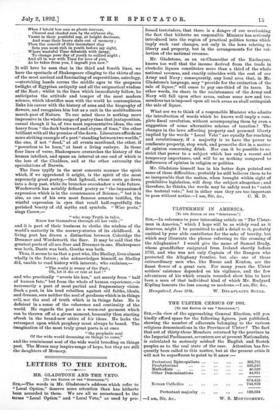LETTERS TO THE EDITOR.
MR. GLADSTONE AND THE VETO. [To THE EDITOR Or THE " BPZOTATOR."1 Sru,—The words in Mr. Gladstone's address which refer to "Local Option," deserve more attention than has hitherto been accorded to them. We are all so accustomed to the terms "Local Option" and "Local Veto," as used by pro- fessed teetotalers, that there is a danger of our overlooking the fact that hitherto no responsible Minister has seriously introduced into the region of practical politics terms which imply such vast changes, not only in the laws relating to liberty and property, but in the arrangements for the col- lection of the national revenue.
Mr. Gladstone, as an ex-Chancellor of the Exchequer, knows too well that the income derived from the trade in alcoholic liquors constitutes more than a third of the whole national revenue, and exactly coincides with the cost of our Army and Navy ; consequently, any local area that, in Mr. Gladstone's language, may "provide for the extinction of the sale of liquor," will cease to pay one-third of its taxes. In other words, its share in the maintenance of the Army and Navy will fall upon other areas, unless some new and tre- mendous tax is imposed upon all such areas as shall extinguish the sale of liquor.
What are we to think of a responsible Minister who admits the introduction of words which he knows well imply a com- plete fiscal revolution, without accompanying them by even a suggestion of some alternative scheme of taxation ? The changes in the laws affecting property and personal liberty implied by the words "Local Veto" are equally far-reaching and revolutionary, if a majority is to have the power to confiscate property, stop work, and prescribe diet in a matter of opinion concerning drink. Nor can it be possible to re- strict that power to a subject which has only a recent and temporary importance, and will be as nothing ()compared to differences of opinion in religion or politics.
Mr. Gladstone himself has in his better days pointed out some of these difficulties; probably he still believes them to be so insuperable that the nation, when brought within sight of prohibitive legislation, will drop the subject altogether ; and therefore, he thinks, the words may be safely used to "catch the teetotal vote ;" but in either case they are too important to pass without notice.—I am, Sir, 8z.c., C. M. D.










































 Previous page
Previous page